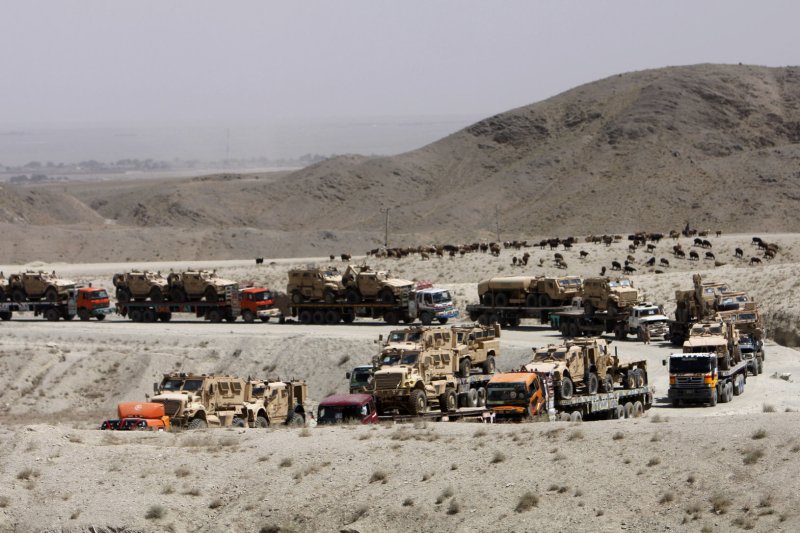Pakistani trucks carrying NATO and U.S military vehicles cross the Quetta Chaman highway at Kojak Pass border area after leaving the southern Afghanistan province of Kandahar near Chaman, Pakistan on July 25, 2013. The trucks head to the port of Karachi, Pakistan as the pullout continues, ending a NATO/USA decade-long military combat involvement in Afghanistan by the end of 2014. There are approximately 60,000 American troops in Afghanistan at present. UPI/Matiullah Achakzai |
License Photo
ISLAMABAD, Nov. 5 (UPI) -- A Pakistani opposition party says it will block NATO supply routes to neighboring Afghanistan if the United States doesn't end its drone strikes.
The Pakistan Tehreek-e-Insaf, which is led by the country's former cricket captain Imran Khan and is the ruling party in the northwestern province of Khyber-Pakhtunkhwa province, voted Monday to block the supply lines beginning Nov. 20 if the drone strikes in nearby tribal areas do not stop.
The PTI is one of the parties which had campaigned strongly against the drone program during general elections last May and its latest resolution comes in the wake of last week's killing of Hakimullah Mehsud, leader of the Pakistan Taliban, in a drone strike. Khyber-Pakhtunkhwa province is the main route for transporting supplies to U.S. and NATO troops in Afghanistan.
Leaders like Khan have criticized the killing of Mehsud, saying the attack had sabotaged or derailed the nascent peace talks with the Taliban.
The PTI resolution setting the Nov. 20 deadline appeared to be an effort to bring more pressure on the federal government of Prime Minister Nawaz Sharif, which does not favor blocking the NATO supply lines, The New York Times reported.
Sharif's Cabinet, which met at a special session Monday, decided to pursue peace talks with the Taliban despite the Mehsud killing. The prime minister told the meeting: "Pakistan has the right to take its decisions on its own according to its interests."
Sharif also said peace cannot be achieved in Pakistan "by unleashing senseless force."
The Times said despite the PTI resolution, the United States is not likely to accede to its demand. Already, there has been a sharp reduction in the number of drone strike so far this year.
The Times also quoted residents in the provincial capital of Peshawar that traffic along the supply routes lately have been coming out of Afghanistan instead of going in as both the U.S. and NATO forces are in the processing of winding down their combat operations by the end of next year.
The report said any attempt to block the routes would only slow the withdrawal of foreign troops from Afghanistan, not something that Khan would want.
The Sharif government also may not wish to push the United States too much over the drone program because of financial implications it might entail. During Sharif's visit to Washington last month, the U.S. government decided to release $1.6 billion of aid that had earlier been frozen.
The Wall Street Journal said it was not clear whether the Khan government in Khyber-Pakhtunkhwa province can legally block the supply line without approval from the federal government.
"What this drone strike has done is put a mass murderer out of business, yet this nation seems to be in mourning," Pakistani security analyst Rifaat Hussain told the Journal. "Politics is driving everything."
U.S. Army Lt. Col. William Griffin, a spokesman for the allied forces, told the Journal it was too early to comment any closure of the Pakistani routes, noting: "Everything right now is moving normally."















